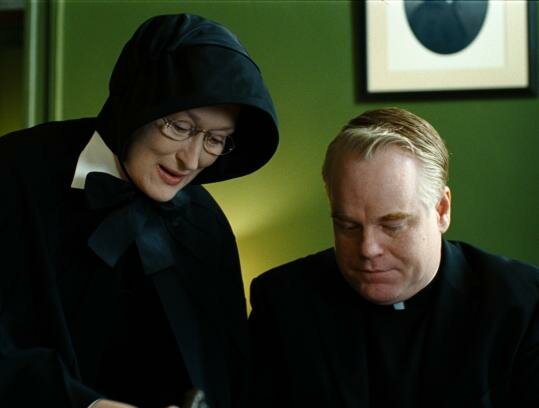No-one need be reminded that a film with Meryl Streep released in the American winter is gunning for Oscar glory. The Academy also seems to have a knack for loving the drama, favouring grief-stricken characters over more comedic roles. It seems then, that Doubt fits the bill and as such has been rewarded for its superb casting. Now up to a record 15 nominations for Streep, she is joined by fellow winner Philip Seymour Hoffman, nominee Amy Adams and Viola Davis, all in supporting categories. While the acting prowess is deservedly recognised, the film itself has a bit to answer for.
Winner of the Pulitzer Prize along with Tony Awards, Doubt is continuing the trend of plays being translated from stage to screen after last month’s Frost/Nixon. Along with the Watergate story, Doubt takes us into a past time where we see America in a time of change. That also seems to be a recurring theme this awards season, and no doubt (pardon the pun) President Obama plays a huge part in that correlation. Set back in 1964, the Bronx’s St. Nicholas school sees the admission of their first black student, Donald Miller. When the favourable priest Father Flynn (Hoffman) takes a special interest in him, Principal Sister Aloysius Beauvier (Streep) is suspicious after innocent Sister James (Adams) reports unusual meetings between Father Flynn and Donald.
 |
Star power is the name of Doubt’s game. It’s easy to get excited while watching this film because of the anticipation of a blowout argument between Streep and Hoffman – and it’s worth every cent of your ticket. The suspense is brilliant in its slow-paced form; with no proof and only moral instinct, just how is she going to prove her case? Will there be any witnesses to the confession? For it’s portrayed to us as almost a certainty that he is guilty of misconduct. Both Streep and Hoffman are brilliant in their execution as opponents – Streep as the old-fashioned Sister who believes in discipline and experience and Hoffman as the vibrant priest who strives to bring the school forward into a new political age. Hoffman comes across as so creepy even when he’s the nice guy, especially in a scene encouraging the boys to clean their fingernails. Subtle scenes all link to form an idea in your head of his innocence or guilt and it keeps you on your toes. Amy Adams was good as the ray of hope in an otherwise bleak-character film, but Viola Davis – while good in only a short role, an Oscar nod is a bit much. Thoughts of where a tissue might be in her bag are prominent as you watch her tear up. It’s easy to feel embarrassed as the close-ups bring about a different sense of disbelief to what’s intended. That may not be her fault but if it has to fall to someone, then the head honcho may be to blame.
John Patrick Shanley held onto his stage creation by writing the screenplay and directing the film, and whether that was a good move remains uncertain. Not all plays transcend well onto the screen and Doubt doesn’t seem to have the ‘it’ factor either. While the dialogue is good for the most part, the screenplay itself doesn’t let you in. Yes, there’s enough there to understand but when the words are never said and the exact details of happenings never outlined, it leaves you feeling out of the loop. Without giving anything away, the satisfaction you get at the end is different to what you feel you should have got. While a lot of films ruin their premise by outlining every single detail to you, here it would’ve benefited the audience to get a sense of closure. The subtle hints are there and easy enough to interpret; the end twist is good but it really isn’t fleshed out much at all, while the ending is ruined by an unnecessary confession from Sister Aloysius that contradicts every decision she made throughout the film.
Doubt deals with a touchy subject that still resides in our world today. In the hope of stamping it out, characters and people like Sister Aloysius take a stand against what is wrong in society, and bringing it to us on the big screen it promotes awareness. Of course, not many of you will be thinking of that while watching it, and instead be focusing on the fantastic performances. It’s a letdown plot-wise – the great suspense is cancelled out by the ultimate lack of climax. While it agrees with the big screen by not having a theatrical feel (think The History Boys), Shanley hasn’t delivered to the screen what he did to the stage.
Conclusion:
If not for the cast of Streep, Hoffman and Adams, no doubt (ah, there it is again) this would have bombed. The premise is good and the suspense is there but more is needed verbally and visually. The brilliant acting is unmatched to the rest of the film and earns it an extra 1/2 a star.
 Follow the author Katina Vangopoulos on Twitter.
Follow the author Katina Vangopoulos on Twitter.
















